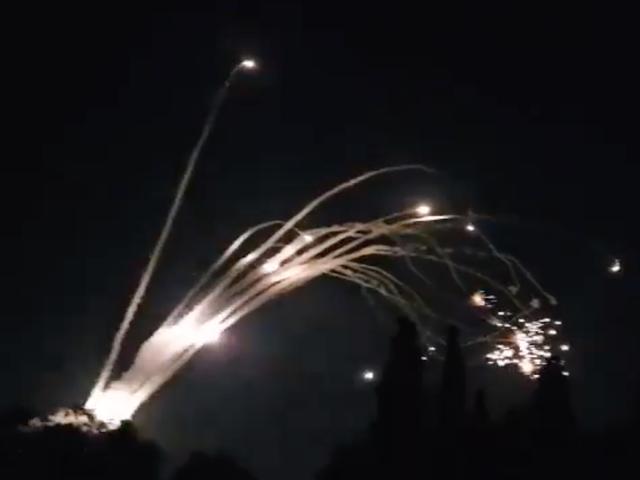Israel has reportedly set a deadline of March 15 for achieving a diplomatic agreement with Lebanon and Hezbollah, amid ongoing border tensions, according to "Western diplomatic sources" cited by the Lebanese newspaper Al-Akhbar.
This development emerges as a critical juncture, with Israel signaling readiness to escalate military operations to a full-scale war if the diplomatic efforts falter. The primary objective of these talks is to address the presence of Hezbollah, designated as a terrorist organization, along Israel's northern border, a situation that has led to increased hostilities, including attacks on Israeli civilians and military targets, and the displacement of tens of thousands of residents.
Israel reportedly set a deadline for reaching a diplomatic agreement with Hezbollah
— i24NEWS English (@i24NEWS_EN) March 7, 2024
'Has Iran shown itself to have more of a step in front of Israel than Israel in front of Iran? I would say it probably has, and it has to be adjusted. We need to start attacking these proxies...… pic.twitter.com/4VZtCY4O9J
The report highlights the gravity of the situation, where Israeli communities near the border have been living under the shadow of evacuation for nearly five months. Defense Minister Yoav Gallant's recent communication with US Special Envoy Amos Hochstein underscores the urgency felt by Israeli authorities, as Hezbollah's persistent aggression pushes the country closer to military intervention in Lebanon.
The intricate dynamics of the conflict extend to the broader geopolitical context, with suggestions that any resolution on the Israel-Lebanon front may be contingent upon achieving a ceasefire in Gaza. The complexities of the dispute, notably around the contested Mount Dov area (Shebaa Farms), demand a comprehensive settlement, including the deployment of the Lebanese army to southern Lebanon, to foster stability and peace.
Told @AlArabiya (Arabic):#Israel's problem is not how far Hezbollah should be pushed from its border with #Lebanon, but that UNSC Resolution 1701 cannot be enforced because Hezbollah militia are never marked or in military uniform. These Hezbollahis pretend to be "locals"… https://t.co/vIbJoJ4aVH
— Hussain Abdul-Hussain (@hahussain) March 6, 2024
The human cost of the ongoing conflict was starkly illustrated by a recent attack in northern Israel, which resulted in the death of an Indian worker, Patnibin Maxwell, and injuries to nine others. This incident, targeting agricultural workers near Margaliot, is a grim reminder of the indiscriminate nature of Hezbollah's operations, which have employed a range of weaponry against specific locations along the border, causing significant destruction and loss of life.
Hezbollah's escalating threat is seen as a manifestation of a broader challenge, where international dynamics have enabled the growth of such groups, drawing parallels with Hamas in Gaza. The narrative of underestimation and miscalculation regarding these groups' capabilities and intentions has led to heightened tensions and a reevaluation of strategic approaches to ensure security and deterrence.
🚨🇮🇱🇱🇧 BREAKING: ISRAEL GIVES HEZBOLLAH MARCH 15 DEADLINE
— Mario Nawfal (@MarioNawfal) March 7, 2024
They have reportedly warned Hezbollah they are preparing for a large-scale escalation in Lebanon if no political settlement is reached by mid-March.
Source: Yediot News pic.twitter.com/ATxPEhD7Cn
In response to these challenges, the international community's role, particularly the UN's effectiveness in curbing Hezbollah's presence on the border, has come under scrutiny. The criticism extends to the broader failure to condemn Hezbollah's actions adequately, reflecting on the complex interplay of international diplomacy and local security imperatives.
Israel's strategic calculus is influenced by the need to navigate the dual threats posed by Hezbollah and Hamas, with considerations of potential two-front conflicts shaping its military and diplomatic posture. The ongoing provocations by Hezbollah, which include targeted attacks and broader threats to civilian life in northern Israel, underscore the imperative for a decisive response to ensure the safety and security of its citizens.
War is a horrible thing. Hezbollah are literally forcing war on Israel and Lebanon. We know how this started, and we know how this will end. https://t.co/X4rQuN7MJl
— Jonathan Conricus (@jconricus) March 7, 2024
As Israel grapples with these multifaceted challenges, the pursuit of diplomatic solutions remains intertwined with the stark realities of security and defense, reflecting a cautious approach to managing and ultimately resolving a profoundly complex and volatile situation. The coming weeks will be critical in determining the course of action, as the deadline approaches and the prospects for peace and stability hang in the balance.


